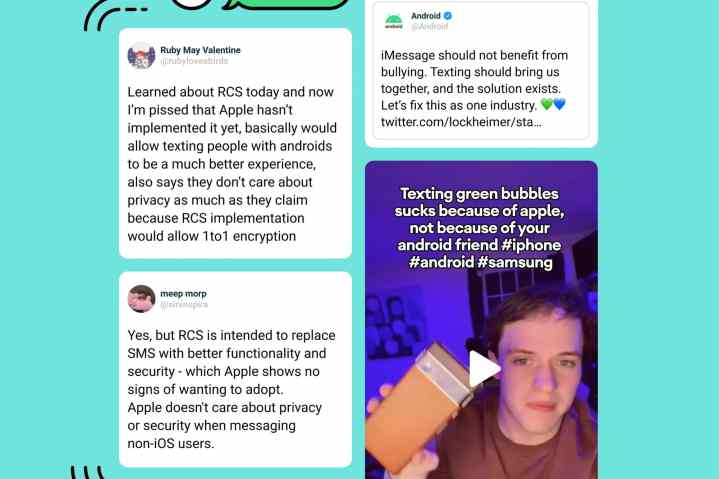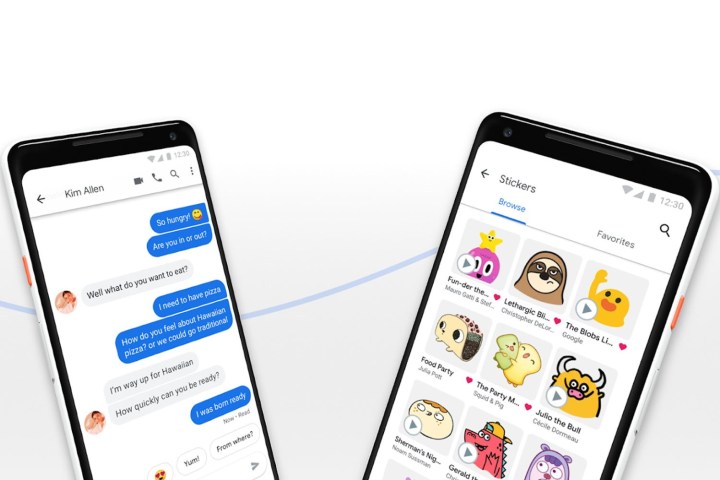Google is stepping up its campaign to drive support for the universal Rich Communication Services (RCS) text messaging standard by increasing the pressure on the biggest holdout: Apple.
A new full-page spread on Google’s Android website is encouraging fans of open text messaging standards to “Help @Apple #GetTheMessage” and expand beyond its proprietary and exclusive iMessage platform to allow for more full-featured text messaging between iPhone and Android users.

Many hoped RCS would come to iOS 16, but there’s been no evidence that Apple has any intention of natively supporting the new technology. Instead, when someone using an iPhone sends a text message to an Android device, it falls back to using SMS/MMS. Meanwhile, iOS 16 adds some nice messaging improvements that will only be available when conversing with folks who are also using iOS 16 devices.
The ‘Green Bubble phenomenon’
This isn’t the first salvo in Google’s fight to get Apple to embrace RCS. Earlier this year, Google executives pointedly accused Apple of “using peer pressure and bullying as a way to sell products.”
Apple’s iMessage lock-in is a documented strategy. Using peer pressure and bullying as a way to sell products is disingenuous for a company that has humanity and equity as a core part of its marketing. The standards exist today to fix this. https://t.co/MiQqMUOrgn
— Hiroshi Lockheimer (@lockheimer) January 8, 2022
Citing a Wall Street Journal report, Hiroshi Lockheimer, Google senior vice president, claimed that the iPhone’s built-in messaging platform effectively divides users into the “haves” and “have-nots.” This is especially prevalent among teens, who the WSJ says “dread the green bubble” — the color used for messages sent using SMS/MMS technology rather than Apple’s more feature-rich iMessage platform.
However, the problem goes much deeper than color choices, and Google’s campaign clearly says “it’s not about the color of the bubbles — iPhone users get a bad texting experience.” It cites specific examples, such as tiny and blurry photos and videos, an inability to leave group conversations, lack of encryption, and more.

Lockheimer’s comments aren’t merely a rival company pointing fingers. Apple could have brought non-iPhone users into the fold years ago by developing an iMessage app for the Android platform. In a revelation that surprised almost nobody, court filings released in Apple’s fight with Epic Games included email conversations between Apple executives where Apple Senior VPs Phil Schiller and Craig Federighi concurred that iMessage locks users into the iPhone ecosystem — and that’s a good thing as far as they’re concerned.
Specifically, Schiller noted that “moving iMessage to Android will hurt us more than help us,” and Federighi added that “iMessage on Android would simply serve to remove [an] obstacle to iPhone families giving their kids Android phones.”
It’s not hard to see why Apple doesn’t have much incentive to embrace RCS. While regulatory pressures may eventually force Apple’s hand, the company has attempted to point to third-party messaging platforms like WhatsApp and Facebook Messenger as examples of how iMessage doesn’t “really” lock users in. It’s hard to argue that point, considering the widespread popularity of these services. In many countries, third-party apps have become the de facto messaging standards for Android users since Google only recently got serious about RCS; for years before that, Android’s native messaging solutions were a mess.
RCS vs. iMessage
Like iMessage, RCS offers enhanced messaging features like read receipts and typing indicators that overcome the somewhat archaic limitations of SMS/MMS messaging — standards developed over 20 years ago that haven’t been meaningfully updated. However, where RCS differs from iMessage is that it’s an open standard, not something cooked up by a single company.
As a standard, RCS isn’t even particularly new. It was proposed over a decade ago by the GSM Association, a worldwide alliance of mobile network operators, as a new mobile industry standard intended to replace the aging SMS/MMS technology.
Unfortunately, since that group is made up of over 800 carriers worldwide, it never succeeded in gaining much traction until Google decided to embrace it as part of Android Messages in 2019. However, Google failed to push hard enough; instead, it left things primarily up to the carriers, with predictable results.
At the time, Verizon, AT&T, T-Mobile, and Sprint formed a group called the Cross Carrier Messaging Initiative to try and standardize RCS independently of Google. That initiative failed two years later, although the silver lining is that this allowed Google to step in and take a more active role in ensuring RCS was implemented correctly.

This included adding features like end-to-end encryption, which is something the carriers would have been reluctant to adopt. It also ensures universal support across all Android handsets since it will be a core part of the Android Messages experience, rather than relying on carrier implementations that might favor their own messaging apps.
Apple remains the most significant holdout in adopting RCS, but Google isn’t pulling any punches in its latest campaign. It’s collected tweets and TikToks from folks frustrated with the poor experience and media articles from the WSJ, CNET, and even Macworld criticizing Apple for its failure to get with the program. Further, it’s encouraging everyone else to add their voice to the chorus by tweeting @Apple to #GetTheMessage and “stop breaking my texting experience.” Whether or not any of this actually helps remains to be seen, but it sure is quite the spectacle.

